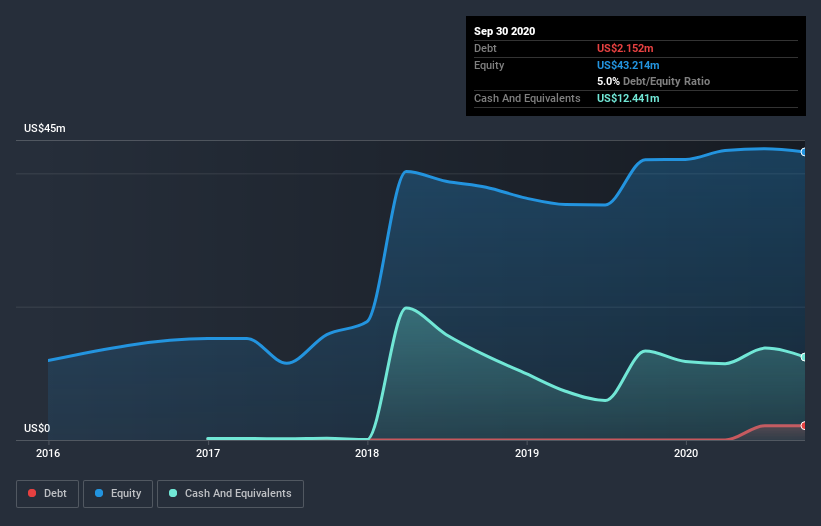The external fund manager backed by Berkshire Hathaway's Charlie Munger, Li Lu, makes no bones about it when he says 'The biggest investment risk is not the volatility of prices, but whether you will suffer a permanent loss of capital.' It's only natural to consider a company's balance sheet when you examine how risky it is, since debt is often involved when a business collapses. As with many other companies Red Violet, Inc. (NASDAQ:RDVT) makes use of debt. But should shareholders be worried about its use of debt?
What Risk Does Debt Bring?
Generally speaking, debt only becomes a real problem when a company can't easily pay it off, either by raising capital or with its own cash flow. Part and parcel of capitalism is the process of 'creative destruction' where failed businesses are mercilessly liquidated by their bankers. However, a more frequent (but still costly) occurrence is where a company must issue shares at bargain-basement prices, permanently diluting shareholders, just to shore up its balance sheet. Having said that, the most common situation is where a company manages its debt reasonably well - and to its own advantage. The first step when considering a company's debt levels is to consider its cash and debt together.
View our latest analysis for Red Violet
How Much Debt Does Red Violet Carry?
You can click the graphic below for the historical numbers, but it shows that as of September 2020 Red Violet had US$2.15m of debt, an increase on none, over one year. However, it does have US$12.4m in cash offsetting this, leading to net cash of US$10.3m.

How Strong Is Red Violet's Balance Sheet?
Zooming in on the latest balance sheet data, we can see that Red Violet had liabilities of US$4.75m due within 12 months and liabilities of US$3.15m due beyond that. On the other hand, it had cash of US$12.4m and US$2.92m worth of receivables due within a year. So it can boast US$7.47m more liquid assets than total liabilities.
This short term liquidity is a sign that Red Violet could probably pay off its debt with ease, as its balance sheet is far from stretched. Simply put, the fact that Red Violet has more cash than debt is arguably a good indication that it can manage its debt safely. There's no doubt that we learn most about debt from the balance sheet. But it is Red Violet's earnings that will influence how the balance sheet holds up in the future. So if you're keen to discover more about its earnings, it might be worth checking out this graph of its long term earnings trend.
Over 12 months, Red Violet reported revenue of US$35m, which is a gain of 33%, although it did not report any earnings before interest and tax. Shareholders probably have their fingers crossed that it can grow its way to profits.
So How Risky Is Red Violet?
While Red Violet lost money on an earnings before interest and tax (EBIT) level, it actually generated positive free cash flow US$35k. So taking that on face value, and considering the net cash situation, we don't think that the stock is too risky in the near term. Keeping in mind its 33% revenue growth over the last year, we think there's a decent chance the company is on track. We'd see further strong growth as an optimistic indication. There's no doubt that we learn most about debt from the balance sheet. But ultimately, every company can contain risks that exist outside of the balance sheet. Case in point: We've spotted 2 warning signs for Red Violet you should be aware of.
Of course, if you're the type of investor who prefers buying stocks without the burden of debt, then don't hesitate to discover our exclusive list of net cash growth stocks, today.
When trading Red Violet or any other investment, use the platform considered by many to be the Professional's Gateway to the Worlds Market, Interactive Brokers. You get the lowest-cost* trading on stocks, options, futures, forex, bonds and funds worldwide from a single integrated account. Promoted
New: AI Stock Screener & Alerts
Our new AI Stock Screener scans the market every day to uncover opportunities.
• Dividend Powerhouses (3%+ Yield)
• Undervalued Small Caps with Insider Buying
• High growth Tech and AI Companies
Or build your own from over 50 metrics.
This article by Simply Wall St is general in nature. It does not constitute a recommendation to buy or sell any stock, and does not take account of your objectives, or your financial situation. We aim to bring you long-term focused analysis driven by fundamental data. Note that our analysis may not factor in the latest price-sensitive company announcements or qualitative material. Simply Wall St has no position in any stocks mentioned.
*Interactive Brokers Rated Lowest Cost Broker by StockBrokers.com Annual Online Review 2020
Have feedback on this article? Concerned about the content? Get in touch with us directly. Alternatively, email editorial-team@simplywallst.com.
About NasdaqCM:RDVT
Red Violet
An analytics and information solutions company, specializes in proprietary technologies and applying analytical capabilities to deliver identity intelligence in the United States.
Flawless balance sheet with solid track record.
Similar Companies
Market Insights
Community Narratives



